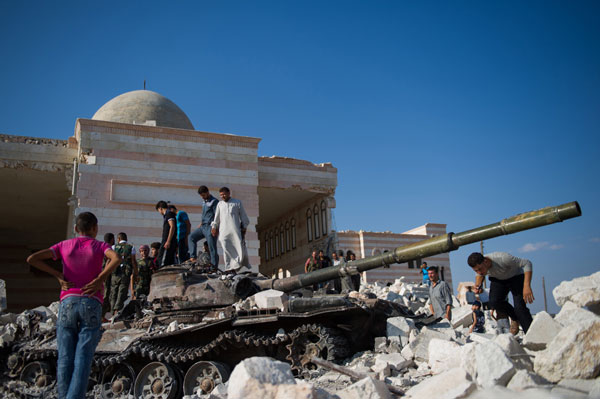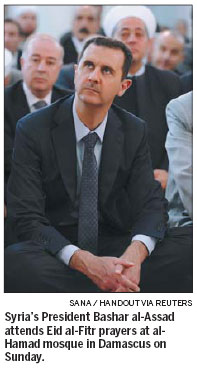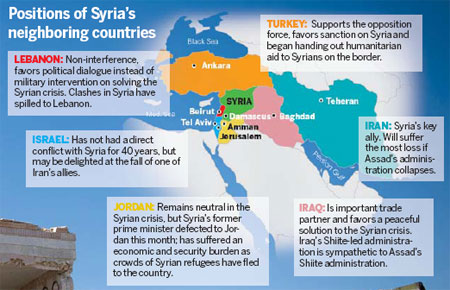
International efforts to peacefully resolve the Syrian crisis continue despite the United Nations Supervision Mission in Syria expiring at midnight on Sunday while intensive fighting remained unabated across the country.
 |
|
Residents of the town of Azaz, some 47 km north of Aleppo, gather around the remains of a tank in front of a bombed-out mosque on Friday. Syrian government troops pounded rebel bastions in Aleppo and other parts of Syria and fierce fighting was reported in Damascus. [Photo/Agencies] |
The Security Council agreed to end the four-month mission and back a new, smaller liaison office that will support any future peace efforts. The establishment of this office is widely seen as a sign of the worsening situation in Syria.
Fighting raged between rebels and troops in Aleppo, a northern commercial hub with a strategic location near the Turkish border, and the heavily populated southern district of Damascus.
|
 |
The 18-month-long fighting has sent thousands of Syrians fleeing into neighboring countries. The UN said at least 170,000 have fled and another 2.5 million inside the Arab country need aid.
The unarmed observer mission in Syria was hobbled from the beginning due to its limited rights and differences among the international community over sanctions to the country and the fate of Syrian President Bashar al-Assad.
The insistence of the opposition that Assad must step down proved to be an insurmountable problem so the fragile cease-fire lasted only a short period of time, said Xue Guoqing, an expert on Arab studies with Beijing Foreign Studies University.
Hua Liming, a former Chinese ambassador to Iran, said the departure of the UN observer mission will not necessarily lead to an escalation of the conflict, because the mission failed to provide balanced monitoring reports which had difficulty being accepted in the West, let alone constrain the fighting.
"But the UN presence in Syria shows the international community has not given up on Syria and remains open to opportunities for A political and peaceful resolution of the crisis," he said.
Gaye echoed Hua's remarks.
"What is important is that the United Nations will stay with the commitment to ending violence and triggering dialogue between the parties," Gaye said.
Lakhdar Brahimi, a veteran Algerian diplomat named on Friday as former UN chief Kofi Annan's replacement, told Reuters it was too soon for him to say if Assad must leave office.
Brahimi's appointment by the Security Council is considered by some Syrian political figures and analysts as a "last-ditch attempt" to salvage the country from the quagmire of civil war.
George Jabbour, a former Syrian parliamentarian, told Xinhua News Agency that appointing Brahimi is a "positive step toward hammering out a political solution to the crisis".
|
 |
Compared with Annan, Brahimi, a peace broker from an Arab country that has dealt with Arab issues for years, may have a better understanding of the Syrian crisis, said Hua.
However, Riad Saker, a political researcher, did not share Hua's optimism. Saker said Brahimi's mission will meet the same fate as Annan's because "the super powers will not cooperate with Brahimi".
The appointment was welcomed by the Assad administration, Russia, China and the West, although the White House said it would seek clarification on the terms of his mandate.
China on Saturday voiced support for Brahimi's mediation efforts, said Chinese Foreign Ministry spokesman Qin Gang, adding that China hopes Brahimi will adhere to the direction of a political solution for Syria and urge all parties in Syria end the violence as soon as possible.
Russian Foreign Minister Sergei Lavrov on Saturday branded as "irresponsible" statements from US officials' claiming they will seek to solve the Syrian crisis that bypassed the UN and the "Geneva communique was dead".